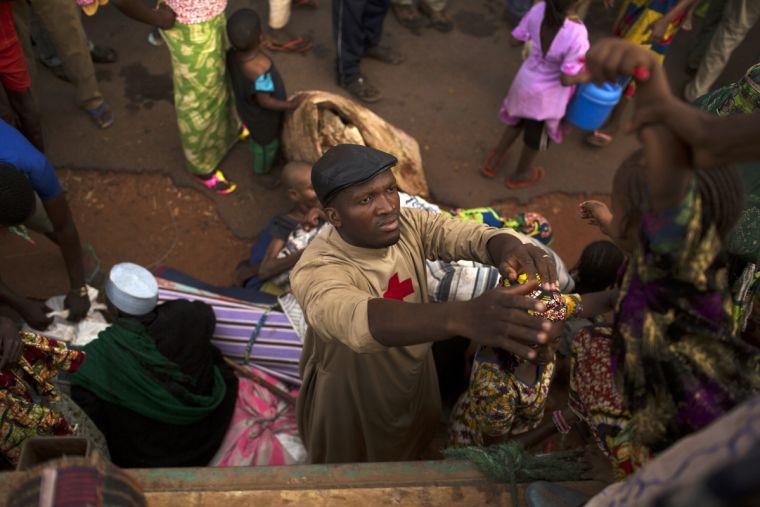Catholic priest who rescued 1,500 Muslims from brutal massacre in line for $1m peace prize

A Catholic priest who sheltered 1,500 Muslims fleeing almost certain death in is in the running to receive a $1 million peace prize.
In 2013, Father Bernard Kinvi opened his church as a place of refuge for Muslims fleeing brutal sectarian violence in the Central African Republic (CAR).
The CAR has been beset by violence since the majority-Muslim Séléka drove out President Francois Bozizé in a coup in March of that year. Though the group has since disbanded, former members continued to target towns and villages across the country, which caused the uprising of an opposing Christian faction, the anti-Balaka. They attacked Muslims, massacring them and destroying their homes and mosques.
Both groups have only loose ties with their religious affiliations, and Muslim and Christian leaders from CAR have united to condemn the conflict.
One of the most violent attacks conducted by the anti-Balaka took place in early 2014 in Bossemptele, a town in the north-west of the country, where Father Kinvi – a missionary from Togo – directs a Catholic mission hospital. More than 80 Muslims were murdered, and Father Kinvi spent days searching for survivors, and bringing them to his church for safety.
"It wasn't a decision; it was just something that happened," he later told the Guardian. "As a priest, I cannot support the killing of a man. We're all human: religion doesn't come into it. If anti-Balaka come in wounded, I treat them.
"I don't care who you are or what you do with your life or what your religion is, you are a human being and I will treat you."
He was intimidated and taunted by the anti-Balaka for his actions. They threatened to kill the Muslims under his care, who at one point numbered around 1,500.
However, the priest was able to organise their transfer over the border into Cameroon and into relative safety. In March 2014, African peacekeepers evacuated the majority of the Muslims who remained, but those who were too weak, children and the disabled, stayed behind at the church.
"When I became a priest, I undertook to serve the sick even if it meant putting my life in danger," Father Kinvi said.
"I said that but I didn't really know what it meant. But when the war came, I understood what it means to risk your life. Being a priest is about more than giving blessings; it's about standing with those who have lost everything."
In an interview with the National Catholic Register, Father Kinvi said the conflict in the CAR has "truly tested my faith", but insisted that it had also caused it to grow.
"I exceptionally experience that our God is always with us in all our trials. I performed some exceptional acts that made me believe that it is the Lord who works in me. This shows God is in control," he said.
"I discovered that only love can destroy the walls of hatred. I thank God that I showed love to all who came to our hospital; I met rebels who once threatened me with death, and I was able to offer my hand to greet them, thanks to this love. Only love can overcome the hatred of the world. And this love we can live through prayer. And each time one asks me where I find the strength to do all that I do, I simply say, 'Jesus Christ.' The Eucharist, adoration, daily prayer of the Rosary: These are my weapons of victory.
"My ministry bears fruit every time I heal more life through faith, prayer and love."
Having already received the Human Rights Watch 'Alison Des Forges' award in recognition of his work, Father Kinvi has now been shortlisted for the Aurora Prize for Awakening Humanity, which will be presented by George Clooney in April.
The award is given to "individuals who put themselves at risk to enable others to survive".
In a statement, the Aurora Prize committee said the priest was selected because he "provided medical assistance and refuge to both sides of an armed conflict, establishing his mission as a safe haven for any and all who were injured, despite the violence that raged outside."











